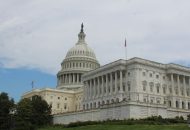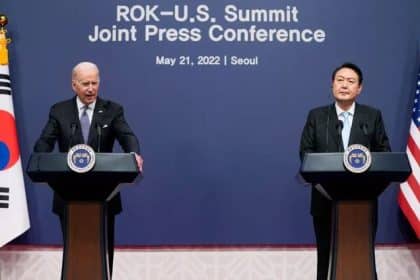Mandates on Credit Cards Will Allow Big-Box Stores to Cheap Out on Security
COMMENTARY

It’s rare these days to see a cash-only business in the United States. Why? Because consumers prefer the security of credit cards and enjoy earning rewards, while businesses like faster, safer transactions and higher sales. Accepting cash is also more expensive for retailers. Cash costs on average over 9% of every transaction. At a cost of 2% of every transaction, credit cards are a bargain for merchants.
Retailers enjoyed a record $6.6 trillion in sales last year as online shopping boomed. But record profits have not stopped big-box retailers from lobbying for handouts in the name of Main Street.
In their latest attempt via the Credit Card Competition Act from Sens. Dick Durbin, D-Ill., and Roger Marshall, R-Kan., mega retailers like Walmart and Target want to take away customers’ choice for how their credit card transactions are routed. None of this has anything to do with small business. Big retailers pushing the bill are no friends of small business.
During the pandemic, small businesses were deemed non-essential and had to close, while big-box stores were permitted to stay open, resulting in a wealth transfer of $250 billion — from small business to big-box stores. Credit cards, on the other hand, played an essential role in helping small businesses survive, enabling mobile orders as well as such developments as curbside delivery.
If the authors of the legislation really intended to help small businesses, they would have limited the bill to small businesses, but it is big-box stores that will benefit from even a few basis points.
Right now, if you use your credit card, you can know that the financial institutions and card networks on your card will protect you from fraud and guard your personal data. You also get to build up rewards — whether it’s airline miles or cash back. But merchants would rather not pay the small fee that contributes to anti-fraud technology and rewards. They’d rather be able to pick no-name routing networks that are cheaper with indeterminate security.
Your security is of no concern to the likes of merchant and retail special interest groups. They know that if someone steals your credit card information, it’s your financial institution that’s on the hook, not them. The truth is that big-box retailers want to route your transaction in the cheapest way possible. Retailers would undercut investments in technology and fraud protection while at the same time eliminating many consumer benefits like rewards. This is exactly what this new routing legislation will allow.
To help build their case for why the government should intervene, merchants are peddling myths about electronic payments. The Economist recently got in on the act when they published a story that fundamentally misstated how interchange works.
Articles like this claim that there is a lack of competition in electronic payments. But you only have to look at the app store on your phone to see that isn’t true. The market is full of fintech startups and investment, and century-old financial institutions are now competing with a myriad of digital payment options such as “Buy Now Pay Later.” Not only are there at least six international credit and debit payment networks, but nearly a dozen regional debit networks.
Merchants like to argue that they will pass on any interchange savings to consumers. But we only have to look back a decade to see through this argument. In 2010, the Durbin Amendment placed a price control on debit card interchange fees and retailers promised they’d pass on the savings. The Federal Reserve Bank of Richmond analyzed the impact of the Durbin Amendment and found that retailers pocketed the savings and, in some cases, even raised prices despite seeing debit costs decline.
What will really happen to consumers is that their credit card rewards will start to disappear. People of all backgrounds use and benefit from rewards. The Federal Reserve estimates that 84% of credit card holders have access to a rewards card and, according to the Consumer Financial Protection Bureau, more than 60% of subprime consumers use a rewards card.
Thankfully, people are speaking out. In fact, more than 170 organizations — spanning across finance, banking, merchant and consumer advocate industries — have come out to oppose the Credit Card Competition Act. Consumers should be able to pick how their transactions are routed, and financial institutions’ technology investments need to be recognized. Congress must not pass this multibillion-dollar handout to merchants that puts rewards and your financial security at risk.
Jeff Tassey is chairman of the Electronic Payments Coalition. You can find EPC on Twitter at @EPC_Updates or on LinkedIn at linkedin.com/company/the-electronic-payments-coalition/.























